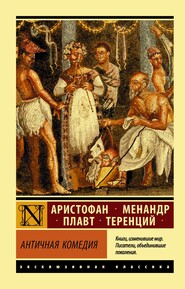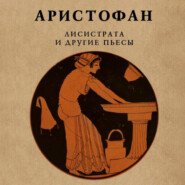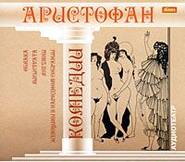По всем вопросам обращайтесь на: info@litportal.ru
(©) 2003-2024.
✖
The Eleven Comedies, Volume 1
Автор
Год написания книги
2018
Настройки чтения
Размер шрифта
Высота строк
Поля
358
That is the vocative of [Greek: oďs], [Greek: oďos], the Ionic form of the word; in Attic Greek it is contracted throughout—[Greek: ois], [Greek: oios], etc.
359
An obscene jest. The Greek word, says the Scholiast, means both barley and the male organ.
360
Before sacrificing, the officiating person asked, "Who is here?" and those present answered, "Many good men."
361
The actors forming the chorus are meant here.
362
Lysimacha is derived from [Greek: luein], to put an end to, and [Greek: mach_e], fight.
363
A tragic poet, reputed a great gourmand.
364
A tragedy by Melanthius.
365
Eels were cooked with beet.—A parody on some verses in the 'Medea' of Melanthius.
366
As a matter of fact, the Sicyonians, who celebrated the festival of Peace on the sixteenth day of the month of hecatombeon (July), spilled no blood upon her altar.
367
A celebrated diviner, who had accompanied the Athenians on their expedition to Sicily. Thus the War was necessary to make his calling pay and the smoke of the sacrifice offered to Peace must therefore be unpleasant to him.
368
A town in Euboea on the channel which separated that island from Thessaly.
369
When sacrificing, the tail was cut off the victim and thrown into the fire. From the way in which it burnt the inference was drawn as to whether or not the sacrifice was agreeable to the deity.
370
This was the part that belonged to the priests and diviners. As one of the latter class, Hierocles is in haste to see this piece cut off.
371
The Spartans.
372
Emphatic pathos, incomprehensible even to the diviner himself; this is a satire on the obscure style of the oracles. Bacis was a famous Boeotian diviner.
373
Of course this is not a bona fide quotation, but a whimsical adaptation of various Homeric verses; the last is a coinage of his own, and means, that he is to have no part, either in the flesh of the victim or in the wine of the libations.
374
Probably the Sibyl of Delphi is meant.
375
The skin of the victim, that is to say.
376
A temple of Euboea, close to Oreus. The servant means, "Return where you came from."
377
This was the soldier's usual ration when on duty.
378
Slaves often bore the name of the country of their birth.
379
Because of the new colour which fear had lent his chlamys.
380
Meaning, that he deserts his men in mid-campaign, leaving them to look after the enemy.
381
Ancient King of Athens. This was one of the twelve statues, on the pedestals of which the names of the soldiers chosen for departure on service were written. The decrees were also placarded on them.
382
The trierarchs stopped up some of the holes made for the oars, in order to reduce the number of rowers they had to supply for the galleys; they thus saved the wages of the rowers they dispensed with.











